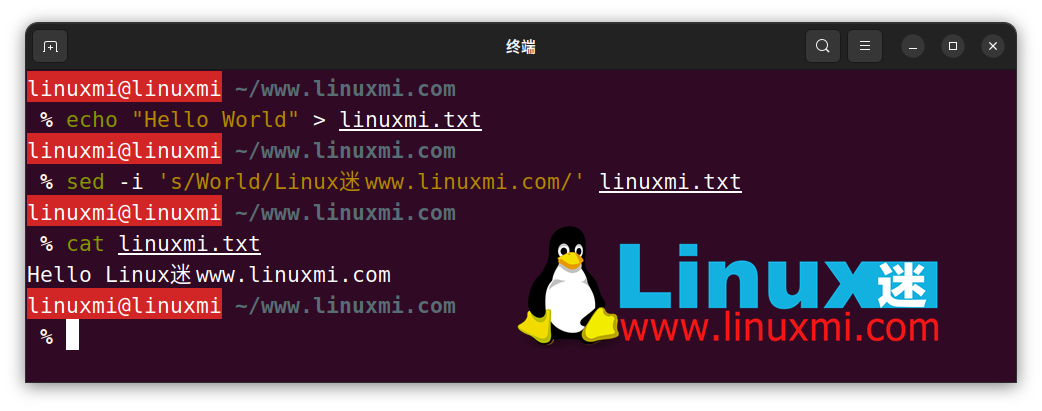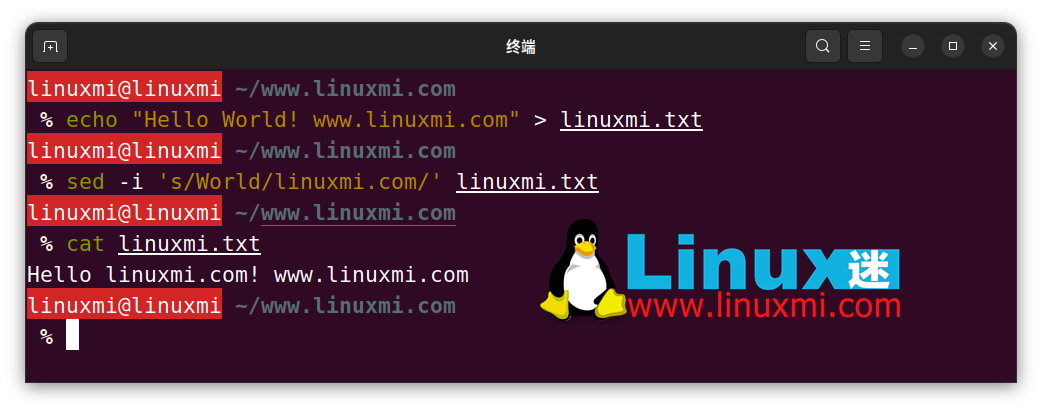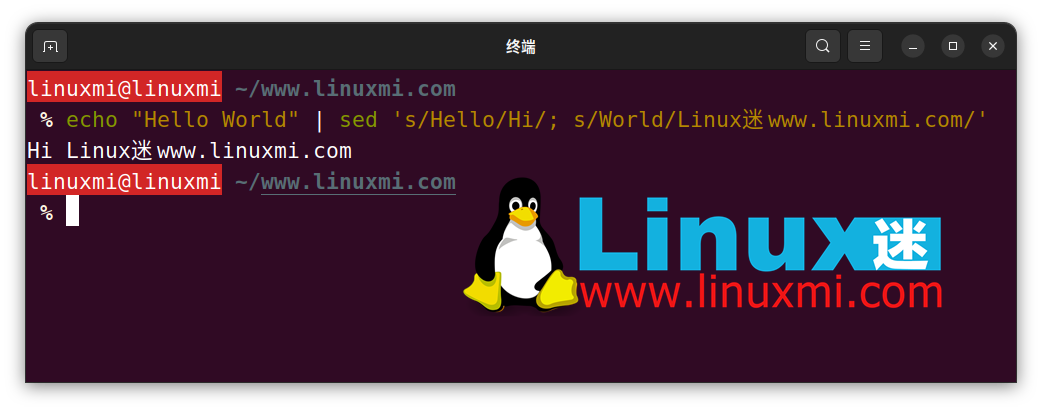A comprehensive guide to mastering the Linux sed command
This article provides a comprehensive guide to the sed command in Linux for beginners, covering its history, uses, and some practical tips and tricks. Understanding sed and using it proficiently, and being able to process text efficiently are valuable skills that any user under Linux should have.

Description
The purpose of this article is to provide beginners with a guide on how to fully use the stream editor sed command in Linux. It covers the command's history, usage, parameters, common use cases, and tips and tricks.
History
The sed command has been part of Linux since the early development of UNIX and is still used today. It is widely used for text processing and is known for its efficiency and speed.
When and why to use it
Use sed when you need to perform text conversion efficiently on a file or stream. Its power lies in its ability to handle large files and use regular expressions for pattern matching and replacement, making it a must-have tool for scripting and data wrangling.
How to use it
The basic syntax of the sed command is sed ‘command’ file_name.
linuxmi@linuxmi ~/www.linuxmi.com % echo "Hello World" | sed 's/World/linux迷www.linuxmi.com/'Hello linux迷www.linuxmi.com

Common parameters
-n: Disable automatic printing mode buffer.
linuxmi@linuxmi ~/www.linuxmi.com % echo "Hello World" | sed -n 's/World/linux迷www.linuxmi.com/p'Hello linux迷www.linuxmi.com

Using the -i parameter, the sed command will directly modify the source file instead of outputting the modification results to the standard output. To prevent data loss, when an extension is given, sed creates a backup file before proceeding with file editing.
linuxmi@linuxmi ~/www.linuxmi.com % echo "Hello World" > linuxmi.txtlinuxmi@linuxmi ~/www.linuxmi.com % sed -i 's/World/Linux迷www.linuxmi.com/' linuxmi.txtlinuxmi@linuxmi ~/www.linuxmi.com % cat linuxmi.txtHello Linux迷www.linuxmi.com

Other supported parameters
- -e: Allows the use of multiple editing commands.
- -f: Allows specifying files containing sed commands.
- -r: Use extended regular expressions.
- -u: Make the buffer unbuffered.
Most common use cases
One of the common use cases for sed is to replace text in a file.
linuxmi@linuxmi ~/www.linuxmi.com % echo "Hello World! www.linuxmi.com" > linuxmi.txtlinuxmi@linuxmi ~/www.linuxmi.com % sed -i 's/World/linuxmi.com/' linuxmi.txtlinuxmi@linuxmi ~/www.linuxmi.com % cat linuxmi.txtHello linuxmi.com! www.linuxmi.com

Tips
sed can perform complex text conversions in a single line of commands by chaining multiple commands.
linuxmi@linuxmi ~/www.linuxmi.com % echo "Hello World" | sed 's/Hello/Hi/; s/World/Linux迷www.linuxmi.com/'Hi Linux迷www.linuxmi.com

Things to note
When using the -i option, be aware that it may cause irreversible modifications to the file. Always make sure to have backups when working with important data.
Summary
sed is a powerful tool for command line text processing. With its help, you can perform complex text conversions efficiently and effectively. Proficiency in sed will increase your productivity in text processing tasks.
The above is the detailed content of A comprehensive guide to mastering the Linux sed command. For more information, please follow other related articles on the PHP Chinese website!

Hot AI Tools

Undresser.AI Undress
AI-powered app for creating realistic nude photos

AI Clothes Remover
Online AI tool for removing clothes from photos.

Undress AI Tool
Undress images for free

Clothoff.io
AI clothes remover

Video Face Swap
Swap faces in any video effortlessly with our completely free AI face swap tool!

Hot Article

Hot Tools

Notepad++7.3.1
Easy-to-use and free code editor

SublimeText3 Chinese version
Chinese version, very easy to use

Zend Studio 13.0.1
Powerful PHP integrated development environment

Dreamweaver CS6
Visual web development tools

SublimeText3 Mac version
God-level code editing software (SublimeText3)

Hot Topics
 What computer configuration is required for vscode
Apr 15, 2025 pm 09:48 PM
What computer configuration is required for vscode
Apr 15, 2025 pm 09:48 PM
VS Code system requirements: Operating system: Windows 10 and above, macOS 10.12 and above, Linux distribution processor: minimum 1.6 GHz, recommended 2.0 GHz and above memory: minimum 512 MB, recommended 4 GB and above storage space: minimum 250 MB, recommended 1 GB and above other requirements: stable network connection, Xorg/Wayland (Linux)
 Linux Architecture: Unveiling the 5 Basic Components
Apr 20, 2025 am 12:04 AM
Linux Architecture: Unveiling the 5 Basic Components
Apr 20, 2025 am 12:04 AM
The five basic components of the Linux system are: 1. Kernel, 2. System library, 3. System utilities, 4. Graphical user interface, 5. Applications. The kernel manages hardware resources, the system library provides precompiled functions, system utilities are used for system management, the GUI provides visual interaction, and applications use these components to implement functions.
 How to run java code in notepad
Apr 16, 2025 pm 07:39 PM
How to run java code in notepad
Apr 16, 2025 pm 07:39 PM
Although Notepad cannot run Java code directly, it can be achieved by using other tools: using the command line compiler (javac) to generate a bytecode file (filename.class). Use the Java interpreter (java) to interpret bytecode, execute the code, and output the result.
 vscode cannot install extension
Apr 15, 2025 pm 07:18 PM
vscode cannot install extension
Apr 15, 2025 pm 07:18 PM
The reasons for the installation of VS Code extensions may be: network instability, insufficient permissions, system compatibility issues, VS Code version is too old, antivirus software or firewall interference. By checking network connections, permissions, log files, updating VS Code, disabling security software, and restarting VS Code or computers, you can gradually troubleshoot and resolve issues.
 vscode terminal usage tutorial
Apr 15, 2025 pm 10:09 PM
vscode terminal usage tutorial
Apr 15, 2025 pm 10:09 PM
vscode built-in terminal is a development tool that allows running commands and scripts within the editor to simplify the development process. How to use vscode terminal: Open the terminal with the shortcut key (Ctrl/Cmd). Enter a command or run the script. Use hotkeys (such as Ctrl L to clear the terminal). Change the working directory (such as the cd command). Advanced features include debug mode, automatic code snippet completion, and interactive command history.
 How to check the warehouse address of git
Apr 17, 2025 pm 01:54 PM
How to check the warehouse address of git
Apr 17, 2025 pm 01:54 PM
To view the Git repository address, perform the following steps: 1. Open the command line and navigate to the repository directory; 2. Run the "git remote -v" command; 3. View the repository name in the output and its corresponding address.
 Where to write code in vscode
Apr 15, 2025 pm 09:54 PM
Where to write code in vscode
Apr 15, 2025 pm 09:54 PM
Writing code in Visual Studio Code (VSCode) is simple and easy to use. Just install VSCode, create a project, select a language, create a file, write code, save and run it. The advantages of VSCode include cross-platform, free and open source, powerful features, rich extensions, and lightweight and fast.
 Can vscode be used for mac
Apr 15, 2025 pm 07:36 PM
Can vscode be used for mac
Apr 15, 2025 pm 07:36 PM
VS Code is available on Mac. It has powerful extensions, Git integration, terminal and debugger, and also offers a wealth of setup options. However, for particularly large projects or highly professional development, VS Code may have performance or functional limitations.






